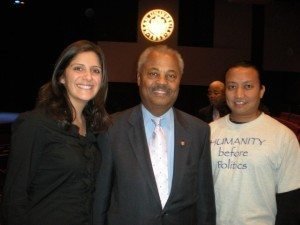Speakers to Include Rwandan Genocide Survivor and Experts on Congo and Darfur
Eugenie was six months pregnant with her daughter Mystica when the genocide in Rwanda broke out in 1994. Losing her husband Damascene to Hutu extremists, she and her daughter escaped the genocide and now reside in New Jersey. Eugenie will be one of several speakers who will share their story at the Nov. 21 workshop.

Hackensack, N.J.—On Saturday, Nov. 21, educators and human rights activists throughout the New Jersey area will gather at Fairleigh Dickinson University for a workshop to join the ongoing movement to end the cycle of genocide, and further engage in educational opportunities on human rights issues in New Jersey.
Entitled “New Jersey Voices Against Genocide,” the five-hour workshop is organized by a team of activists in the area, including Genocide Intervention Network 2009 Carl Wilkens fellow Karine Shnorhokian, as well as Fairleigh Dickinson University faculty Diana Cvitan and Khayti Joshi, student activists Nia Holston and Lindsay Mulford, and several others.
“We are grateful to Fairleigh Dickenson University for providing the venue for this conference and to all of our speakers and co-sponsors,” said Shnorhokian. “As a descendent of Armenian Genocide survivors, it is my duty and obligation along with others to ensure that present-day acts of genocide are stopped.”
Registration for the workshop will begin at 8:30 a.m., with the workshop promptly beginning at 9 a.m. and concluding at 2:15 p.m. Attendees will receive breakfast and lunch. Educators that attend the workshop will receive separate curriculum instructions that apply to teaching about genocide during the afternoon sessions, and will be awarded five continuing education hours.
To register for the workshop, visit https://secure.acceptiva.com/?cst=fd81cf. A $10 registration fee is requested to ensure your spot. Attendees are encouraged to bring supplies such as index cards, notebook paper, pencils, and pencil sharpeners that will be donated to the Ourebassoni Darfur Refugee Camp in Chad with the help of the NJ Darfur Coalition.
Speakers include Dr. Lee Ann De Reus, associate professor at the University of Pennsylvania Altoona; Eugenie Mukeshimana, a Rwandan Genocide survivor; Yahya Osman, vice president of the Darfur Rehabilitation Project; Jane Wells, founder of Three Generations and Producer of Devil Came on Horseback; as well as local community leaders and activists, and invited Congressmen representing Bergen County.
FDU’s director of the Office of Global Learning, Diana Cvitan, said, “As global citizens, we need to be concerned about the protection of human rights. This event will help students and other members of the FDU community gain a deeper understanding of current realities and learn ways in which they can engage in advocacy for the prevention of genocide around the world.”
Current cosponsors of the event include the Armenian National Committee of America, Fairleigh Dickinson University, Genocide Intervention Network, New Jersey Coalition Responds to the Crisis in Darfur, Ramsey High School STAND Chapter, Three Generations, and 96 West Café in Allendale. The New Jersey Holocaust and Genocide Commission has also been instrumental in their support of the conference.
Individuals or organizations interested in attending or co-sponsoring the event can contact Karine Shnorhokian by calling (201) 788-5425 or emailing njagainstgenocide@gmail.com.


The Rwandan Tribes Signed Their Own Genocide*
Genocide recurred,
This time between tribes.
Born from the same century,
Lived on the same ground.
Who can understand
Why they did what they all did?
Nations stayed watching
Till lives ended, unread.
Hate and hate and hate
Abolishes all faiths,
Aggravates, dominates till it slays
Even newborns in wombs, in shade.
I watched many documentaries on TV
As if the bones, like branches of trees,
Fell down, dried like sticks unbound,
Moved by birds, rats on the bare grounds.
This is what humanity called
Kill slay and then cry wail.
Can Rwandan ask them selves?
Why that jetted innocent blood was crazed?
What does it mean to pray
For bones that can no longer be buried.
Waiting to be carried?
To rest unmarried!
On sins, none can creed!
___________________
* Rwandan genocide sparked between Tutsi and Hutu tribes after the death of president J. Habyarimana. His plane was shot down in Kigali airport on April 6, 1994. It was estimated that one million people died. Most of those who perpetuated the violence were Hutus.
From the book ” A poetic Soul Shined of Genocides” by Sylva Portoian,MD (Auguast 2008)